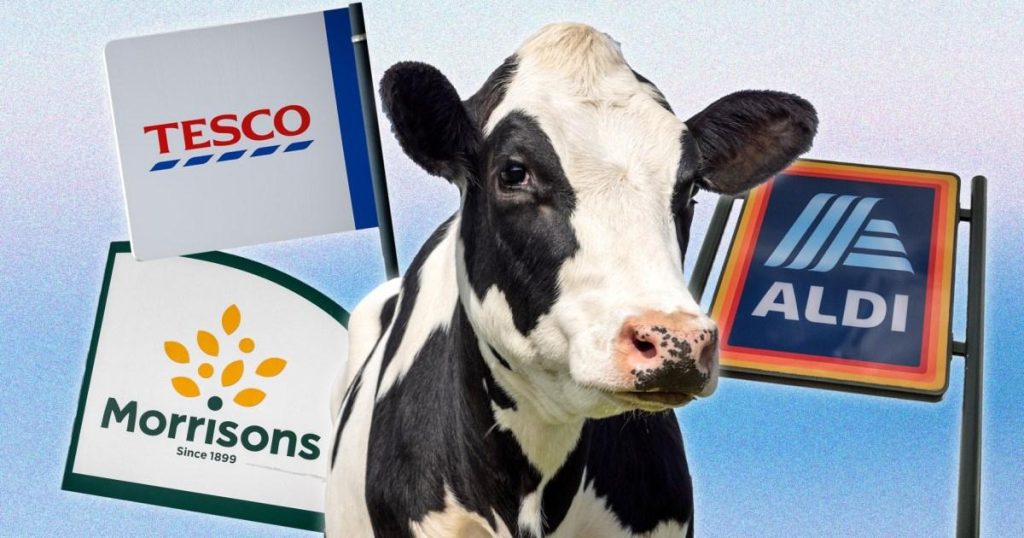Arla’s Bovaer Trial Sparks Consumer Backlash Amidst Misinformation
Arla Foods, a major dairy producer supplying products to leading UK supermarkets and coffee chains like Starbucks, has initiated a trial of Bovaer, a feed additive designed to reduce methane emissions from cows. Methane, a potent greenhouse gas significantly contributing to global warming, is produced by cows through their digestive processes. While the UK Food Standards Agency has approved Bovaer for use, deeming it safe for consumers, the announcement of Arla’s trial has triggered a wave of negative reactions from shoppers. Many have expressed concerns, fueled by misinformation circulating online, and some have even boycotted Arla products, publicly discarding them in protest. The trial involves 30 farms and includes a range of products, from milk and butter to cheese and ready-made coffee drinks.
The controversy surrounding the trial highlights the complexities of addressing climate change within the food industry. While Bovaer presents a potential solution for reducing methane emissions from livestock, consumer apprehension underscores the need for clear communication and transparency regarding the safety and efficacy of such solutions. Arla has emphasized that Bovaer does not affect the milk’s quality or safety and has been approved by regulatory bodies in several countries. However, the negative response illustrates the challenge of gaining public trust and acceptance for new technologies and approaches, particularly when addressing sensitive issues like food production and environmental impact.
Much of the consumer backlash stems from misinformation, including unfounded claims linking the Bovaer trial to Bill Gates. While Gates has invested in a similar methane-reducing product developed by Rumin8, he has no affiliation with Bovaer. Arla has refuted these claims, reiterating that the safety of consumers and animals is their top priority. The company stresses the extensive testing and approvals Bovaer has undergone, emphasizing that it does not pass from the cow into the milk. This misinformation highlights the susceptibility of consumers to unsubstantiated claims, especially when circulated through social media, and the importance of verifying information from credible sources.
Bovaer, developed by DSM, has received regulatory approval in several countries, including Brazil, Chile, the EU, the United States, and Canada. Its use is permitted for cows, sheep, and goats in some regions, while others have restricted it to dairy cows. The additive works by inhibiting the enzyme responsible for methane production in the cow’s digestive system. Arla’s trial partners include major retailers such as Morrisons, Aldi, and Tesco, who view this collaborative effort as a key step in addressing the climate challenges faced by the food system. The National Farmers’ Union has also expressed support for such initiatives, emphasizing the need for strong evidence supporting their efficacy and safety to build farmer confidence.
The diverse range of Arla products involved in the trial further amplifies the potential impact of Bovaer. Popular brands like Lurpak butter, Cravendale milk, and various cheese brands, including Castello and Apetina, are included in the trial. The inclusion of Arla Organic products and ready-made chilled coffee drinks for Starbucks further expands the reach of the trial across different consumer segments. This broad range of products underlines the potential for Bovaer to significantly reduce methane emissions from the dairy industry if adopted widely.
The consumer reaction to Arla’s Bovaer trial underscores the challenges inherent in introducing new technologies and practices within the food industry. While the scientific evidence supports the safety and efficacy of Bovaer, public perception and acceptance remain crucial for its successful implementation. The spread of misinformation highlights the need for transparent communication and accessible information to counter unfounded fears and promote informed decision-making. The trial’s outcome and the subsequent public discourse will significantly influence the future of methane-reducing solutions in the dairy industry and their potential to contribute to mitigating climate change. The collaboration between Arla, retailers, and farmers demonstrates a collective effort to address environmental challenges, emphasizing the importance of partnerships in driving sustainable change within the food system.











